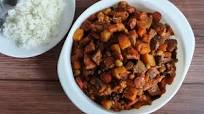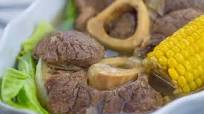What should I make for dinner tonight? This might just be the number one question that we ask ourselves almost daily over here.
Then you have come to the right place, we have rounded up 15 batangas menudo recipe that we have shared over the years.
Plus, there is such a variety of flavours in these recipes, so you are sure to find something for you. Most of these recipes are quick and easy ones made especially for busy weeknights.
15 Batangas Menudo Recipe
Batangas-Style Menudo Recipe
Menudo with Raisins and Green Peas
Pork Menudo
How to Cook Pork Menudo
Paksiw na Pata Batangas Style
Pork Menudo
Spicy Sausage Tortellini Soup
Pork Mendereta – Menudo/Caldereta
How to Cook Chicken Menudo
Igado
Mechadong Baka – Filipino Meat & Potato Stew
What is Filipino Menudo made of?
Filipino Menudo is a hearty and tasty pork stew made with fresh tomatoes, potatoes, carrots, and garbanzo beans. It’s easy to make and delicious with steamed rice!
What is Filipino Menudo called?
Menudo, also known as ginamay or ginagmay (Cebuano: “[chopped into] smaller pieces”), is a traditional stew from the Philippines made with pork and sliced liver in tomato sauce with carrots and potatoes. Unlike the Mexican dish of the same name, it does not use tripe or red chili sauce.
What part of meat is Menudo?
In Mexican cuisine, Menudo, also known as pancita ([little] gut or [little] stomach) or mole de panza (“stomach sauce”), is a traditional Mexican soup, made with cow’s stomach (tripe) in broth with a red chili pepper base.
Do Filipinos eat Menudo?
Pork menudo is another dish that can be found in any Filipino gathering. In addition, it can commonly be eaten as part of an everyday meal. Filipino pork menudo traditionally consists of chunks of pork that is stewed in a tomato sauce.
What cooking method is used in menudo?
Instructions
- Combine pork, soysauce, and lemon in a bowl. Marinate for at least 1 hour.
- Heat oil in a pan.
- Saute garlic and onion.
- Add the marinated pork. Cook for 5 to 7 minutes.
- Pour in tomato sauce and water and then add the bay leaves. …
- Add-in the liver and hot dogs. …
- Put-in potatoes, carrots, sugar,salt, and pepper.
What organ is in menudo?
Thus, menudo often includes various types of organ meats, brains, tails, and even hooves. Most common of all the organs used is the intestines. Since cattle tend to have long sections of this particular organ, the intestines and the stomach are often used. Cilantro is often chopped into menudo.
Where is menudo originally from?
Although menudo hails from Mexico, southwestern United States residents have adopted the dish, and it’s widely served at Mexican restaurants across the region – though often to mixed reviews. Those who love the dish often grew up eating the stew, which is also known as pancita or mole de panza.
What is the difference between menudo and pozole?
Posole and Menudo are both traditional Mexican soups made with hominy. The main difference between the two soups is the meat used to make these soup recipes. Pozole is made with pork (pozole de puerco or pozole rojo) and sometimes chicken. On the other hand, Menudo is made with tripe (cow stomach).
What is the most popular Filipino food?
The lechon kawali, the deep fried pork, is a popular Filipino food all over the country.
Is menudo healthy to eat?
Menudo is actually good for you. According to the USDA nutrient database, a 1-cup serving of the dish contains about 180 calories and 16 grams of lean tissue-building protein. With 6 grams of fat per cup and 16 grams of carbohydrates, menudo fits into a healthy meal plan.
Is tripe healthy to eat?
Potential Health Benefits of Tripe
Protein helps keep you full and allows your body to repair damaged tissue and build muscle. A three-ounce serving of tripe contains 10 grams of protein, which is about 20% of average daily requirement. Tripe is rich in vitamin B12, which helps prevent anemia.
How do you clean menudo meat?
Most tripe comes bleached, but it’s still best to clean it prior to use. To do so, scrub the surface of the tripe with rock salt on both sides. Rinse with white vinegar, clearing each of the chambers, following it up with a good scrape with a sharp knife on both sides to clear any remaining residue.














